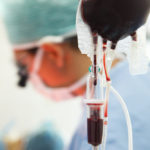
A diagnostic accuracy study for predicting who should have an Advance Health Directive (AHD)
This study sought to validate a modified CARING tool (termed PREDICT) using a population of patients presenting to the Emergency Department. Advanced health directives are legal documents that outline patients’ desires for end-of- life care. For individual’s nearing the end of their lives, advanced health directives are an important part of their treatment plan. This is because they tell health care providers about the patient’s wishes regarding treatment near the time of death. However, very few patients hold these documents. This study looks to see whether we can easily identify individuals who are nearing the end of their lives, and…
Principal Investigator:
Dr Philip Richardson
Amount Awarded: $47,003
Institution: Royal Brisbane & Women's Hospital
READ MORE
READ MORE

CT coronary angiography assessment of emergency patients presenting with undifferentiated chest pain and intermediate risk of coronary artery disease.
Patients presenting to the emergency department (ED) with chest pain who are assessed as having an intermediate risk of coronary artery disease (CAD) pose a diagnostic and management problem. An unstructured approach to patient management may lead to either inappropriate discharge and a missed myocardial infarction (in 1%–5% patients) or unnecessary, prolonged admissions. This has resulted in the development of a Chest Pain Assessment Service (CPAS) at The Prince Charles Hospital (TPCH). Patients admitted to CPAS undergo an exercise stress test (EST) in order to further risk stratify them into either high or low risk groups. With their result from…
Principal Investigator:
Dr Allison Fifoot
Amount Awarded: $50,000
Institution: The Prince Charles Hospital
READ MORE
READ MORE

C.R.A.S.H. study: A randomised study of tissue oxygenation in an ovine model of haemorrhagic shock comparing the effect of colloid, fresh red cells, aged red cells and saline.
Blood loss is a major cause of early deaths after trauma, accounting for 51% of the deaths occurring during the initial 48 hours after hospital admission. Decisions made in the early treatment of severe blood loss have important consequences for patient survival and length of time in the Intensive Care Unit. Red blood cell (RBC) transfusion is a key component of the management in acute haemorrhagic shock, based on the assumption that transfused RBCs improve delivery of oxygen to the tissues. However existing evidence suggests this may not be the case. Recent studies suggest however that transfusion of older blood…
Principal Investigator:
Dr Andrew Staib
Amount Awarded: $106,375
Institution: Princess Alexandra Hospital
READ MORE
READ MORE

Prospective cohort study of cardiac risk profile of Emergency Department patients with chest pain: a comparative analysis of risk stratification tools.
Appropriate disposition of emergency department (ED) patients with chest pain is dependent on clinical evaluation of risk. A number of chest pain risk stratification tools have been proposed. The aim of this study was to compare the predictive performance for major adverse cardiac events (MACE) using risk assessment tools from the National Heart Foundation of Australia (HFA), the Goldman risk score and the Thrombolysis in Myocardial Infarction risk score (TIMI RS). This prospective observational study evaluated ED patients aged ≥30 years with non-traumatic chest pain for which no definitive non-ischemic cause was found. Data collected included demographic and clinical information,…
Principal Investigator:
Dr Ellen Burkett
Amount Awarded: $50,000
Institution: Princess Alexandra Hospital
READ MORE
READ MORE

Australia, Asia and New Zealand Dyspnoea in Emergency Departments Study
Shortness of breath (dyspnoea) is a terrifying symptom experienced by patients and is a common reason for presentation to Emergency Departments. There are a wide range of causes including flair up due to chronic conditions such as asthma, heart failure, chronic lung disease or liver or kidney failure. Acute conditions such as a collapsed lung, chest infection (including pneumonia), trauma (including fractured ribs), airway blockage or an allergic reaction can also be the cause. There is significant knowledge about patients who are admitted to hospital with common causes, however there is little conclusive information about Dyspnoea as a symptom, the…
Principal Investigator:
Prof Gerben Keijzers
Amount Awarded: $96,000.00
Institution: Gold Coast University Hospital
READ MORE
READ MORE





